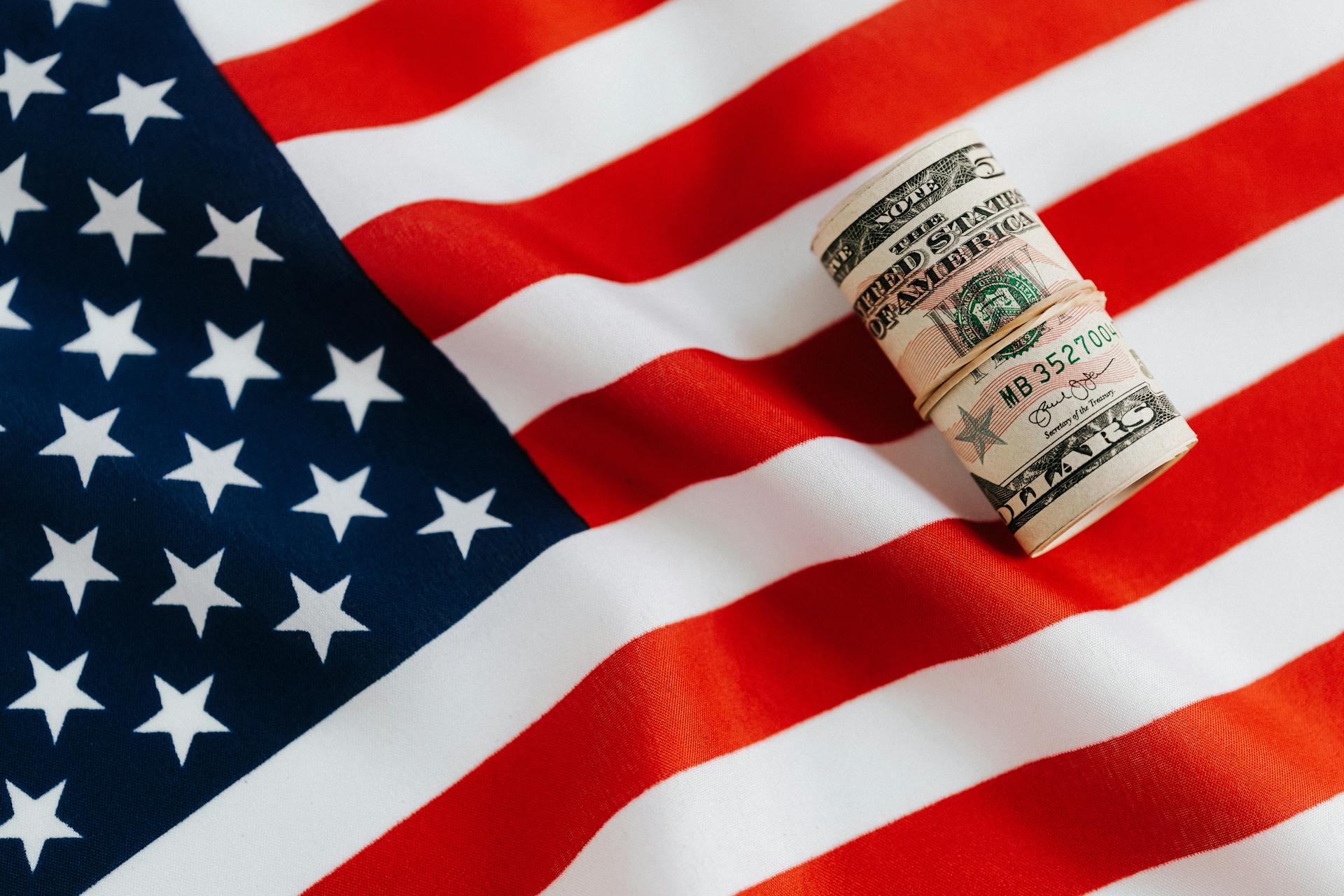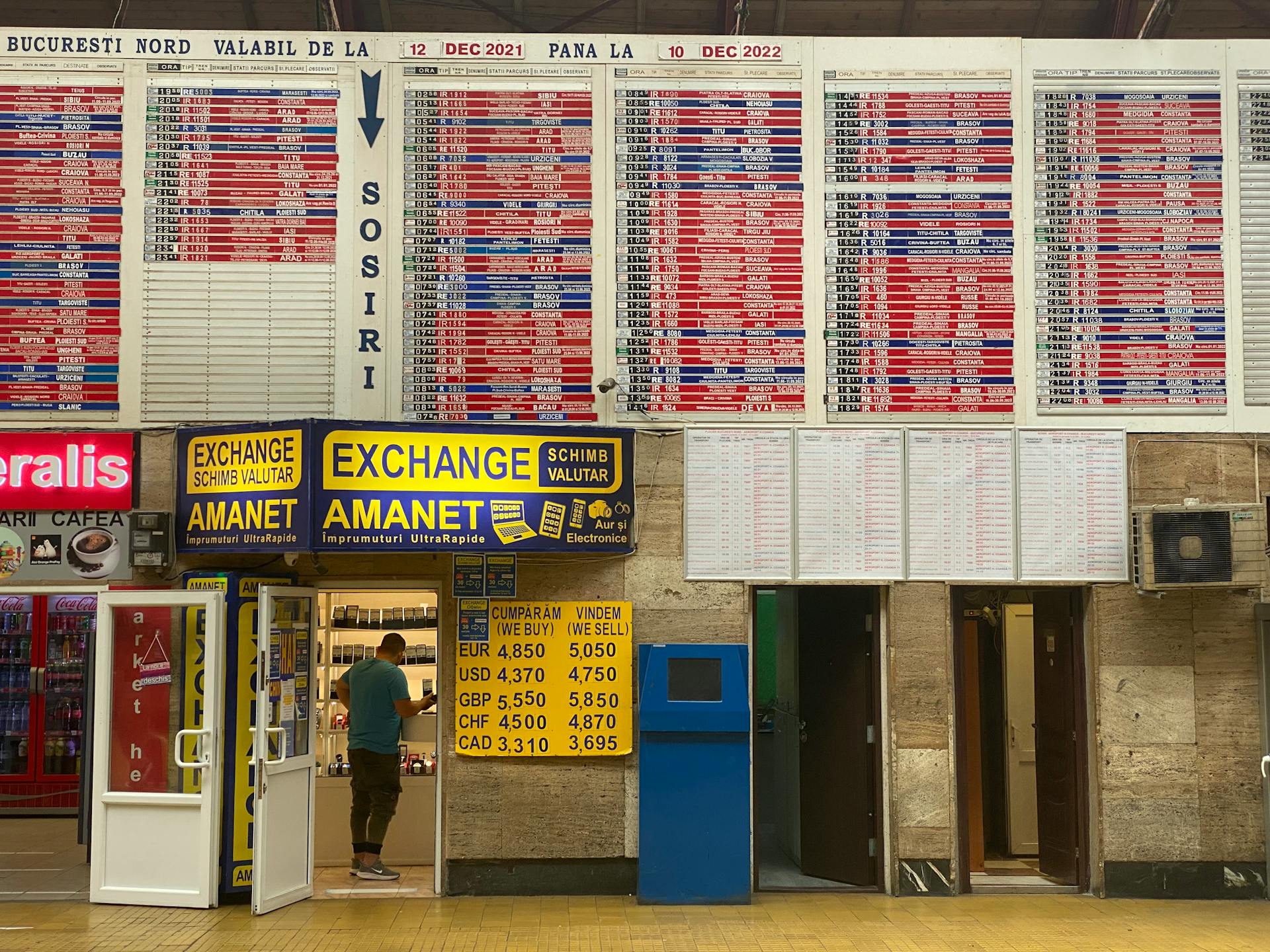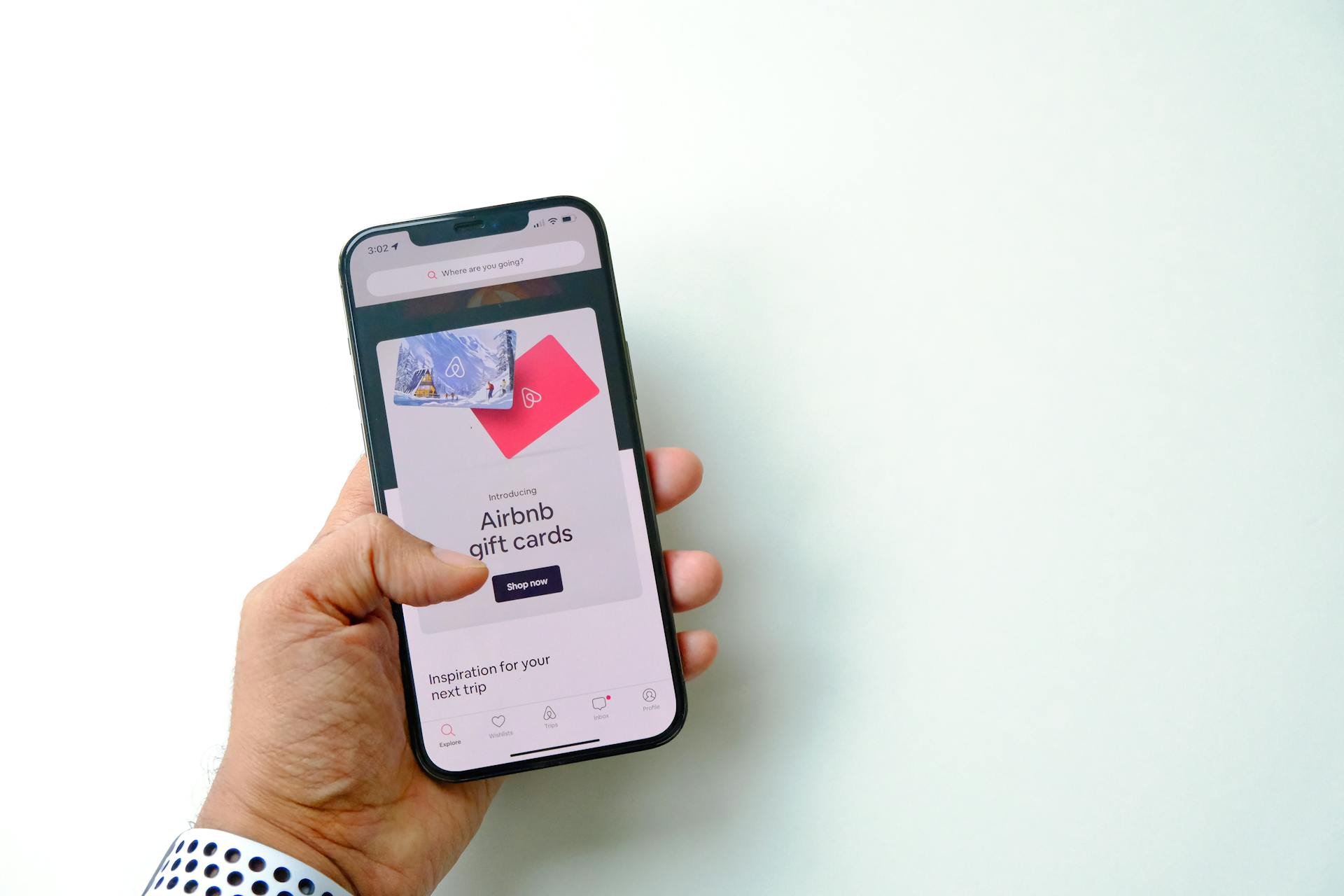
Currency conversion fees and foreign transaction fees are two separate charges that can add up and surprise you on your next international trip.
Many credit cards charge a 1-3% currency conversion fee, which is a markup on the exchange rate.
To avoid extra charges, consider using a credit card with no foreign transaction fee, such as the Chase Sapphire Preferred.
These cards can save you up to 3% in fees on every transaction.
What You Need to Know
Using a credit or debit card in another country can result in foreign transaction fees as well as currency exchange fees. These fees can be a significant addition to your bill, so it's essential to understand how they work.
Some merchants offer dynamic currency conversion (DCC), which shows purchase prices in U.S. dollars rather than the local currency. DCC is almost always more expensive, sometimes considerably so.
To avoid or minimize these fees, choose cards without them. Some cards are specifically designed to eliminate foreign transaction fees, making them a great option for international travelers.
Broaden your view: Why Are Ethereum Fees so High
These fees can be combined and referred to as a single foreign transaction fee. It's essential to understand what you're paying for and how to avoid it.
Here are some key things to keep in mind:
- Foreign transaction fees can be avoided or minimized by choosing cards without them.
- Dynamic currency conversion (DCC) is often more expensive and should be avoided.
Converting Cash
Converting cash can be a costly mistake if you don't do it right. Generally, you'll get the best deal at your local bank or credit union, and some will even waive added fees for their customers.
Hotels and airport kiosks have a reputation for being bad places to exchange currency, except as a last resort. Using your debit card at an ATM affiliated with your bank can be a low-cost option for obtaining cash in another country.
Using a credit card to get local currency at an ATM can be a costly mistake, because you may be charged a hefty cash advance fee plus interest. This can quickly add up, especially if you're making multiple transactions.
Take a look at this: Local Currency News
If you make 15 international purchases at $25 each, you would pay $11.25 in foreign transaction fees with a 3% transaction fee rate. This is equivalent to $105 in fees for a $3,500 spending trip.
Here are some key things to keep in mind when converting cash:
- Banks and credit unions often offer the best exchange rates and no added fees for their customers.
- Using a debit card at an ATM affiliated with your bank is a low-cost option for obtaining cash.
- Credit cards can charge high cash advance fees and interest rates for ATM transactions.
Understanding Fees
Foreign transaction fees and currency conversion fees are often used interchangeably, but they're not the same thing. A foreign transaction fee is a charge that credit card issuers impose on purchases made abroad, typically ranging from 2% to 3% of the purchase amount. It's a fee that can add up quickly, especially if you're making multiple purchases during a trip.
Some credit card issuers, like Capital One and Discover, offer cards with no foreign transaction fees, which can save you a significant amount of money on your next international trip. For example, if you charge $5,000 on a card with a 3% foreign transaction fee, you'll pay an extra $150.
Here's a breakdown of the fees you might encounter when traveling abroad:
Remember, it's essential to understand these fees before making international purchases or withdrawing cash from an ATM abroad.
What Is a Fee?
A currency conversion fee is a charge that financial institutions or networks impose when you convert one currency into another. It's also known as a foreign currency conversion fee or foreign currency exchange fee.
These fees can be hidden and not immediately apparent, making it difficult to know the true cost of your purchase. You can get around this by using a currency exchange rate app, such as the Xe Currency Converter.
A foreign transaction fee is a per-transaction fee charged by credit and debit card issuers and ATM networks on purchases or withdrawals made overseas. The fee typically runs between 2% and 3% of the dollar amount of the purchase or withdrawal.
For example, if you spend $1,000 in a department store, a 3% foreign transaction fee would add a $30 surcharge to your bill. That's the result of a foreign transaction fee imposed by the card issuer.
Currency conversion fees can be charged by credit or debit card payment processors or ATM networks, or through a process called dynamic currency conversion (DCC). DCC can cost up to 12% of the purchase amount, making it a potentially whopping extra charge.
You have the right to refuse DCC, and it's up to you to decide if the extra charge is worth knowing the cost immediately.
A unique perspective: Ach Debit for Consumers
Fees
Fees are a crucial aspect of international travel, and understanding them can save you a significant amount of money. Credit cards often charge a foreign transaction fee, which can range from 2% to 3% of the purchase amount. This fee is typically charged by the card issuer, and it's not uncommon for it to be around 3%.
Using an ATM abroad can also incur fees, including a foreign ATM fee, which can be waived by some banks. In addition to the foreign ATM fee, you may also be charged a flat fee from your bank for using an ATM not affiliated with the bank, which is typically $5. Some credit cards also charge a currency conversion fee, which can be as high as 12% through dynamic currency conversion (DCC).
To minimize these fees, it's essential to choose a credit card with no foreign transaction fees. Some credit cards, such as those from Capital One and Discover, offer this feature, while others, like American Express, charge a 2.7% foreign transaction fee. Here's a breakdown of the standard foreign transaction fees for some popular card issuers:
Paying with cash can also help you avoid foreign transaction fees, but it's essential to be aware of any fees associated with withdrawing cash abroad.
Use a Card
Using a card with no foreign transaction fees is the easiest way to avoid these fees. You can find top credit cards with no foreign transaction fees in TPG's regularly updated guide.
Cash-back cards, however, tend to charge foreign transaction fees. Cards like the Chase Freedom Unlimited and the Blue Cash Preferred Card from American Express are examples.
Banks like Charles Schwab offer free ATM withdrawals and will even reimburse ATM fees charged by out-of-network ATMs. This can be a great option for getting cash overseas.
Consider applying for a new credit card with no foreign transaction fees before your next trip. Cards like consumer Capital One and Discover cards, and many travel reward credit cards, come without foreign transaction fees.
Here's an interesting read: Crypto Atm Card
Tips and Strategies
When traveling abroad, using a card without foreign transaction fees can save you a significant amount of money.
Having a card that doesn't charge foreign transaction fees is a game-changer for frequent travelers.
One way to avoid foreign transaction fees is to make purchases in local currency.
This can be as simple as paying for a meal in euros instead of using your credit card to convert the amount.
To stay on top of currency conversions, downloading a currency conversion app before you travel is a great idea.
This can help you quickly check exchange rates and make informed decisions about your purchases.
Bottom Line
Foreign transaction fees can be a real nuisance when traveling abroad. You'll almost always have to pay a fee for the privilege of exchanging currency, with fees ranging from 2% to 3% of the purchase price.
Some cities have several places to exchange currency, but be aware that some locations may be more expensive than others. It's essential to pack the right credit and debit cards before you go to minimize your total foreign transaction fees.
Choose a card with zero foreign transaction fees to save hundreds of dollars over the course of an international trip. Consider using a top travel rewards card or one from Capital One or Discover.
To avoid foreign transaction fees, pay in the local currency instead of U.S. dollars to avoid poor conversion rates. Some popular cards that offer zero foreign transaction fees include the Wells Fargo Active Cash, Chase Sapphire Preferred, and Amex Gold.
Here are some top travel rewards cards that can help you avoid foreign transaction fees:
- Wells Fargo Active Cash
- Chase Sapphire Preferred
- Amex Gold
- Amex Platinum
- American Express Black
- Chase Sapphire Reserve
- Capital One Venture X
- Chase Freedom Flex
- Citi Double Cash
Avoiding Fees
To avoid foreign transaction fees, consider applying for a new credit card with no foreign transaction fees before your next trip. Many popular travel credit cards, such as the Chase Sapphire Preferred Card, Bank of America Travel Rewards credit card, and the Capital One Venture Rewards Credit Card, give cardholders the ability to use their cards abroad and pay no international transaction fees.
Some banks, like Charles Schwab, offer free ATM withdrawals and will even reimburse ATM fees charged by the out-of-network ATM. You can also use an ATM to withdraw cash in local currency, which is often the best way to get cash overseas.
A fresh viewpoint: Wells Fargo Rewards Program
Here are some key facts to keep in mind:
- Many credit cards, including those from Capital One and Discover, have zero foreign transaction fees.
- Visa and Mastercard charge a 1% fee to banks for processing purchases made abroad, and many U.S. issuers tack on an additional 1-2% fee.
- Avoid 'dynamic currency conversion' by choosing to pay in the local currency.
Return
If you're not careful, you might end up paying a lot more than you expected on your return trip. One way to avoid this is by using a reputable credit card with no foreign transaction fees, like some cards that offer airline miles, cash back, and lost luggage insurance.
You can also avoid currency conversion fees by choosing to purchase in the local currency, which ensures you get a well-negotiated exchange rate. This is because your card issuer controls when they process the conversion.
If you do end up paying a foreign transaction fee, it can range from 1% to 4% of the transaction amount. This fee is usually levied by the credit card payment processor or the ATM network.
Some credit cards don't charge foreign transaction fees, and it's worth applying for one if you plan to do a lot of travel abroad. These cards can provide other travel benefits, such as airline miles and cash back.
Related reading: Business Advantage Travel Rewards Bank of America
If you're shopping online with foreign merchants or buying a ticket for a foreign museum or tour, be aware of foreign transaction fees, which can range from 0% to 3% of the purchase price. These fees can be added to your purchase.
Here are some tips for avoiding foreign transaction fees on your return trip:
- Use a credit card with no foreign transaction fees
- Purchase in the local currency
- Be aware of the exchange rate and commission built in
- Consider using a credit card with a competitive exchange rate, like Visa or Mastercard
By following these tips, you can avoid paying unnecessary fees on your return trip and save some money for your next adventure.
Avoiding Fees
To avoid foreign transaction fees, consider applying for a new credit card with no foreign transaction fees before your next trip. Many popular travel credit cards like the Chase Sapphire Preferred Card and the Capital One Venture Rewards Credit Card give cardholders the ability to use their cards abroad and pay no international transaction fees.
You can also use an established bank's ATM and pull money out in local currency without incurring excessive fees. Banks like Charles Schwab offer free ATM withdrawals and will even reimburse ATM fees charged by the out-of-network ATM.
Paying in local currency is always the best option, as it ensures you get a well-negotiated exchange rate. Avoid using dynamic currency conversion, as it usually comes with a less favorable exchange rate and additional fees.
Here's a list of some cards that don't charge foreign transaction fees:
- Capital One cards
- Discover cards
- Chase Sapphire Preferred Card
- Capital One Venture Rewards Credit Card
To avoid fees, it's essential to understand the terms and conditions of your credit card, including foreign transaction fees. Check the rates and fees table to see whether or not your card charges foreign transaction fees.
Frequently Asked Questions
Is 3% foreign transaction fee high?
A 3% foreign transaction fee may not seem excessive at first, but it can add up quickly, especially for frequent travelers or heavy international spenders.
What is the foreign currency transaction fee?
A foreign currency transaction fee is a charge added to international purchases or transactions, typically ranging from 2.5% to 3.5% of the transaction amount. This fee can add up quickly for frequent travelers, making it essential to understand how it affects your international spending.
Does Visa charge a currency conversion fee?
Yes, Visa charges a 1.0% International Service Assessment (ISA) fee for purchases made in another currency and converted to U.S. dollars. This fee is applied in addition to the exchange rate.
Sources
- https://www.investopedia.com/currency-conversion-fee-definition-4768870
- https://www.forbes.com/advisor/credit-cards/foreign-transaction-fees-vs-currency-conversion-fees/
- https://www.investopedia.com/foreign-transaction-fee-vs-currency-conversion-fee-know-the-difference-4768955
- https://www.nerdwallet.com/article/credit-cards/foreign-transaction-fee
- https://thepointsguy.com/credit-cards/foreign-transaction-fees/
Featured Images: pexels.com


